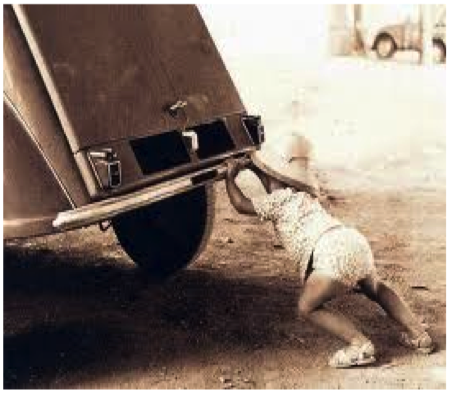Self-Efficacy: Creating Trailblazers who Believe in Themselves
“I think I can. I think I can. I think I can.”
“I know I can. I know I can. I know I can.”
- The Little Engine that Could
“You have brains in your head. You have feet in your shoes. You can steer yourself in any direction you choose.” – Dr. Seuss
 These words from some of our favorite childhood classic books embody the spirit and attitude that we all wish for our children. We all want our children to have limitless optimism in the face of adversity, perseverance in working through challenges, and the ability to overcome failure. At Woodlawn, we strive to instill a student-driven desire to be lifelong learners. To develop this intrinsic motivation requires the development of self-efficacy – ability to define a goal, persevere, and see oneself as capable.
These words from some of our favorite childhood classic books embody the spirit and attitude that we all wish for our children. We all want our children to have limitless optimism in the face of adversity, perseverance in working through challenges, and the ability to overcome failure. At Woodlawn, we strive to instill a student-driven desire to be lifelong learners. To develop this intrinsic motivation requires the development of self-efficacy – ability to define a goal, persevere, and see oneself as capable.
But sometimes, our best intentions get in the way of fostering resilience. As parents and educators, we face a natural instinct to want to make children simply feel better when they are flustered by attempting to uplift their self-esteem with global words of praise: “You are awesome!” “It will be okay.” “You are the best.” or by manipulating their environment in an effort to shield them from failure, sadness, or difficult circumstances. However, we must be careful not to confuse self-efficacy with self-esteem. As Dr. Karen Reivich puts it, “self-esteem is about feeling good about oneself, and self-efficacy is all about effecting change in the world”. She further explains that the “road to resilience is through self-efficacy, not self-esteem, and if your child is confident and knows how to master what life throws in his/her path, self-esteem will follow.” The best way to help children feel good about themselves is not to offer frequent praise but instead provide them opportunities to discover what their strengths are and assist them in developing the belief that they can rely on those strengths when faced with challenges.
So… how do we do it?
Instilling Sense of Mastery: Sense of mastery happens when a child is able to fully understand or grasp a specific skill, subject, or task at hand. In turn, the child understands his or her success as being within his or her control. Experiences that reinforce a child’s strengths in mastery of a task will reinforce their self-efficacy: “I got a good grade on that test because I engaged, understood, and prepared.” On the other hand, children do not experience a sense of mastery when they believe that success is outside of their control and/or blame their performance on external factors: “That test must have just been really easy and everyone got good grades,” “I’m just good/bad at this,” or “The teacher is just mean and unfair and gave me a bad grade.”)
Observing Others and Overcoming Early Challenge: Observing someone else – especially someone the child relates to – grasp a specific skill or overcome an obstacle, in turn, directly impacts a child’s belief that he or she can also be successful in similar situations. Engaging in tasks that are incrementally challenging -- difficult enough to hold interest but not so difficult that they trigger frustration -- also helps build a child’s belief in his or her ability to be successful. Mastering such incremental challenges also strengthens a children’s resiliency; when encountering new obstacles, they experience less anxiety and are more likely to persist in their efforts.
Process- and Strength-Based Praise: In a study at Columbia University involving over 400 children, those who were praised for their efforts and specific strategies and strengths were found to be more likely to engage and persist in future challenging tasks than those children who received general or empty self-esteem praise. Praising effort and specific skills leads to continued effort and persistence.
Teach Goal Setting: After 20 years of research, psychology professor Gabriele Oettingen of New York University and the University of Hamburg devised a simple cognitive tool that can assist in setting goals and sustaining the motivation to obtain them. The WOOP method stands for: Wish, Outcome, Obstacle, and Plan. Peer-reviewed studies and research conducted demonstrates gains in GPAs, attendance rates, greater self-regulation for those considered “at-risk” for ADHD, more diligent PSAT practice, and increased retention of new foreign language words. Oettingen has even devised a free WOOP app to help students on their pathway to college.
Develop Optimism and Identify Successes: We know that optimism is a foundational brick to building resiliency in our children. Research indicates that what helps people through failures, setbacks, and adversity is the ability to think optimistically and act accordingly. Those who develop optimistic thinking focus on what they can control in their world and ask questions such as, “What can I control and how can I make this situation better?” We can increase our children’s optimism and in turn, their self-efficacy, by teaching them how to challenge their negative thoughts and how to analyze their successes. By identifying negative thoughts and providing evidence that they are inaccurate, we help our children develop truthful and rational thinking. By reframing their cognitive beliefs, children are then able to more clearly see how their own strengths, skills, and strategies can bring about successful outcomes. A “success journal” can even assist students in identifying and understanding how their specific strengths and skills helped them accomplish their goals. When children have setbacks or failures, be honest and realistic. Pretending it didn’t happen, looking elsewhere for reasons, or sugar-coating the truth is ultimately not beneficial. Instead, talking openly with your child through the setback - and helping him or her identify what skills or strengths they may use the next time to help them be more successful - is essential. This not only demonstrates empathy for what a child is going through, but it also aligns parents and children as teammates working together.
Why is all this so important?
 Ongoing psychological and educational research shows that students who have a strong sense of self-efficacy are more motivated and dedicated, demonstrate increased perseverance, work harder, are more optimistic, and display less anxious behaviors. A strong sense of self and belief in one’s own abilities to withstand adversity, persevere, and achieve success is essential in the lifelong journey to learn and flourish with courage, grace, and humility.
Ongoing psychological and educational research shows that students who have a strong sense of self-efficacy are more motivated and dedicated, demonstrate increased perseverance, work harder, are more optimistic, and display less anxious behaviors. A strong sense of self and belief in one’s own abilities to withstand adversity, persevere, and achieve success is essential in the lifelong journey to learn and flourish with courage, grace, and humility.
Resources:
Karen Reivich, PhD, is the codirector of the Penn Resliency Project, a research associate in the Positive Psychology Center of the University of Pennsylvania
Self-Efficacy: Helping Children Believe They Can Succeed (NASP Handout)
Dr. Gabriele Oettingen – The Character Lab and WOOP goal-setting




